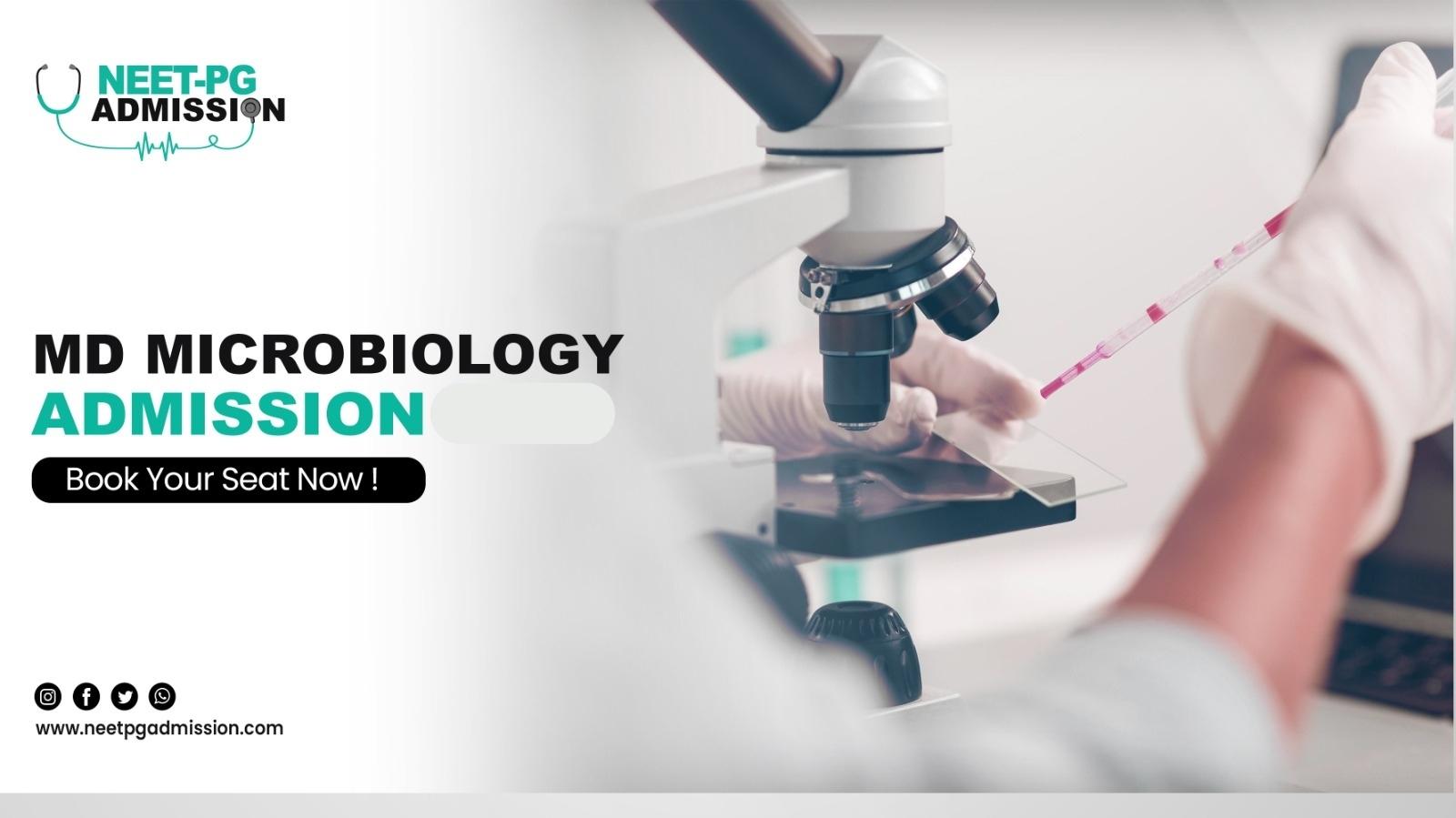MD Microbiology is a 3-year postgraduate medical program that deals with the study of microorganisms and their impact on the human body. Microbiology is a biological study of microbes that covers various microorganisms. This includes bacteria, viruses, fungi, protozoa, parasites, etc. Thus, simply we can say It is a medical specialty that focuses on the diseases and infections caused by microbes and their diagnoses, treatment, and prevention. Additionally, it helps to curb the increasing resistance of microorganisms.
During the MD Microbiology course, the students gain deep knowledge of the various aspects of microorganisms, their structure, effect, and origin of infectious diseases. They are well trained to deal with any type of serious, emergency, and pandemic cases.
The 3 years designed curriculum consists of the subjects like microbiology, virology, immunology, microbial biotechnology, veterinary, medical microbiology, etc. Apart from that, the students gain profound knowledge of the fundamentals of microorganisms and the infections caused by them. Additionally, the students are taught to operate advanced laboratory techniques to identify and control the spreading of various infections.

Course Details: Doctor of Medicine in Microbiology
| Course Name | Doctor of Medicine in Microbiology |
|---|---|
| Duration | 3 Years |
| Eligibility | MBBS with 50% marks from a recognized medical college. |
| Admission Process | Based on the merit of the entrance examination and counseling |
| Course Fee | 50,000 – 14,00,000 INR annually |
| Average Starting Salary | 8 – 12 Lakh Per Annum (LPA) |
| Job Roles | Microbiologist, Physician, Consultant, Medical Scientist, Biological Scientist, Occupational Therapist, etc. |
| Top Recruiting Organizations | Apollo, AIIMS, GNRC, Lakshmi Life Sciences Ltd, Krauter Healthcare Ltd, etc. |
Why Study MD Microbiology?
MD Microbiology is an evolving branch. After the COVID-19 pandemic, it has got great recognition which is noteworthy. Candidates can find a lucrative job after pursuing MD in Microbiology. Here is a list of reasons why you should take this branch.
- A single microbe can change the entire world. After COVID-19 Pandemic we have learned how deadly these viruses can be. Hence, because of the widespread use of these infectious diseases, the demand for skilled microbiologists is increasing rapidly.
- Microbiology is the backbone of antibiotics. A microbiologist plays a crucial role in identifying the type of infection and in controlling its spread which can be highly satisfying.
- Being an ever-evolving branch the microbiologist will get multiple opportunities to update their skills and knowledge with advanced research and technology.
- An important reason why you should opt for MD Microbiology is its versatile career opportunities. You can work in a variety of settings such as healthcare, research center, academics, private practice as well as industries.
Eligibility Criteria
- The aspirants must hold an MBBS degree from a recognized medical college approved by MCI.
- Must have done a year of rotating internship after completion of MBBS program.
- The aspirant’s score in MBBS must be 50 % or above.
Admission Procedure
The admission procedure for MD Microbiology may involve a few steps. Listed below are the procedures one must follow to get admission to the MD Microbiology course.

How to Apply?
The students can apply online or visit the college physically. The online process is followed by the submission of the application form through the college’s website. This includes providing some personal and academic details as well as required documents. After submission, your application will be verified and you will be invited to the counseling session. The counseling session includes personal interviews, group discussions and sometimes written tests.
Selection Process
The selection process is strictly based on the score of the entrance examination and MBBS. NEET is the widely accepted entrance examination for all PG programs. After the entrance examination, the respective institutes publish a merit list which is based on the score of the entrance examination. After that, the students who meet the cut-off will be called for the counseling session. After the counseling session, the final process involves document verification, seat allotment, and payment of fees.
Top colleges including Seats
| College Name | State/ City | Type | Seats |
|---|---|---|---|
| All India Institute of Medical Sciences | New Delhi | Government | 17 |
| Christian Medical College | Vellore | Private | 2 |
| Kasturba Medical College | Manipal | Private | 8 |
| Jawaharlal Institute of Postgraduate Medical Education and Research | Puducherry | Government | 7 |
| Stanley Medical College | Chennai | Government | 2 |
| King Georges Medical University | Lucknow | Government | 16 |
| Grant Medical College | Mumbai | Government | 3 |
| Medical College | Kolkata | Government | 2 |
| Lady Hardinge Medical College | New Delhi | Government | 3 |
| RG Kar Medical College | Kolkata | Government | 4 |
| Seth GS Medical College | Mumbai | Government | 10 |
| BJ Medical College | Ahmedabad | Government | 8 |
| Osmania Medical College | Hyderabad | Government | 15 |
| SMS Medical College | Jaipur | Government | 1 |
| Gandhi Medical College | Hyderabad | Government | 4 |
| Bangalore Medical College and Research Institute | Bengaluru | Government | 9 |
| Maulana Azad Medical College | New Delhi | Government | 3 |
Career Prospect & Salary
After MD Microbiology you can fetch a rewarding career. The successful accomplishment of this course opens multiple doors of opportunities for you. You can join any government or private hospital, have your private clinic or go for further studies. Let us see the various opportunities in various fields. You can choose any area according to your skill and expertise.
Microbiologist: Microbiologists are concerned with treating infectious diseases and preventing their control. They work in hospitals, clinics, laboratories, etc.
Epidemiologists: They are responsible for the epidemic. They detect and control the widespread infectious diseases.
Public Health Microbiologist: After MD Microbiologist you can also work as public health microbiologist in health departments and also government agencies. They are responsible for observing and keeping track of the infection control and health issues of the community.
Medical writer: After MD Microbiology you can also join as a medical writer for medical journals, pharmaceutical companies, and other healthcare organizations. They write content and journals related to microbiology.
Professor: After MD Microbiology you can also work as a professor. As an educator, you will be responsible for teaching microbiology to the students of medical colleges and various institutes.
Job Roles and Average Annual Salaries
| Job Role | Average Annual Salary |
|---|---|
| Microbiologist | 4 – 12 Lakh Per Annum (LPA) |
| Food Quality Assurance Scientist | 5 – 8 LPA |
| Epidemiologist | 6 – 10 LPA |
| Lab Assistant | 3 – 8 LPA |
| Public Health Microbiologist | 8 – 15 LPA |
| Technical Brewer | 3 – 8 LPA |
| Medical Writer | 3 – 8 LPA |
| Professor | 4 – 8 LPA |
Super specialization after MD Microbiology
After successful completion of MD Microbiology, you will have two options. You can get a job and earn a handsome salary or you go for super specialization and gain more expertise in your field. Let us check the super specialty courses you can pursue after MD Microbiology according to your skill and interest.
- Immunology: This specialization is the study of the immune system, including its structure, function, and diseases.
- Virology: Virology is an eminent branch of microbiology. It focuses on the study of different types of viruses, including their structure, function, and type of infections and diseases it causes.
- Microbial Genetics: It is the study of microorganisms for various purposes. It involves the genetic make of the microorganisms and how they interact with the humans and environment.
- Environmental Microbiology: It is the study of how microorganisms react to the environment and human beings.
- Mycology: Mycology is the study of fungi, their properties as well as infections caused by them.
Pros and Cons of MD Microbiology
| Pros | Cons |
|---|---|
| Biology is composed of various branches and specialties. This can be a blessing for the students of MD Microbiology. | Because of the popularity and more demand for this specialty, there is enough competition in the admission process. |
| There is an excellent scope in the research section. Being a researcher you develop new therapies, vaccines, and other tools for the control of infectious diseases. | This branch requires enough hard work and dedication. The tenure of MD Microbiology is of 3 years. Moreover, you need to spend a few years more to learn better practice. It can be challenging for those who desire to settle early. |
FAQ
- Who is a Microbiologist?
Microbiologists are specialist doctors who control and treat infectious diseases that are caused by various microorganisms.
- What can I do After MD Microbiology?
After MD Microbiology you will have ample options. You can join any government or corporate hospital as a microbiologist or study further doing super specialty courses to gain more expertise in the field.
- What is the eligibility of MD Microbiology?
To study MD Microbiology you need to complete MBBS first, after that you have to qualify NEET PG entrance examination with a good rank.
- Which is the top college of India to study MD Microbiology?
All India Institute of Medical Sciences is the best Institute in India to study MD Microbiology.
- What are the 5 different fields of MD Microbiology?
The five fields of Microbiology are Virology, Bacteriology, Parasitology, Protozoology, Phycology, and Mycology.
